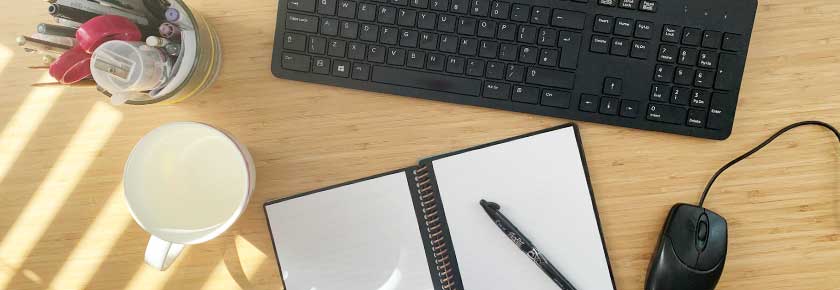Working from home
Working from home and self-isolating can be difficult, but being aware of a few key aspects can help make it easier to deal with, and more positive for your mental health. UoB Sport & Fitness psychologist Chris Pszyk writes about working from home or by yourself, and some different suggestions to help cope with the challenges that it might pose.
With this being a new experience for a lot of people, it is important to consider the impact that being restricted in your freedom of movement will have on your well-being, so that some sense of normality can be maintained. Below are a few aspects that can be helpful when adapted to suit your individual needs. Psychologically, there are a myriad of benefits that can be achieved through routines, mindfulness, and exercise amongst others, with the main ones focused around the release of endorphins, and the reduced output of cortisol, the so-called stress hormone. Managing these two, alongside a variety of other aspects, help us to live healthily and happily, and can therefore help us to manage isolation, and working from home, much more efficiently and positively for our mental health.
Break up work and ‘life’
One of the most important aspects is to separate the different parts of your life, that have now all been brought into the same space. If you have the space, have a dedicated work station that is separate to where you sleep, eat and take time to engage in your hobbies and pastimes. This helps to separate your different activities, and therefore reduces the release of cortisol in relation to your life spaces. In addition, doing small extras like having a morning routine of showering, eating breakfast and ‘getting ready’ for work will be more mentally rewarding, and are positively correlated to self-confidence.
Exercise
Exercising is a huge factor in maintaining wellbeing, and taking the time out of your day to do this is vital. As social distancing and isolation are in full effect, it is a good idea to consider what tools you have available, and make the most of the space that you can use. If you have a treadmill or other equipment that is great, but if you don’t, you can do lots of home workouts, as directed by other staff members, or through online means as well. Not only does exercise help to release endorphins and make us feel better, it can help to break up the monotony of sitting in front of a computer and being alone, as well as helping to maintain good health and improve your quality of sleep.
Be mindful and reflect
Mindfulness is a tool often recommended by psychologists, and given the current situation would be a beneficial habit to start. For those not familiar with it, it focuses on the idea of being present and focusing on the here and now, rather than what might happen and the aspects that you can’t control. In order to help with this, free apps such as HeadSpace or Calm can be really useful to start, and taking time out of your day to reflect and look at all that you have accomplished will help to get through isolation by building your self-esteem.
Look after your space and yourself
There are two parts to this – look after yourself by eating well, drinking plenty of water and sleeping at least 7 hours, but also look after your space. Physically, it is essential that your routine of eating, sleeping and so forth is maintained, and supplementing this by taking the time to prepare food where possible can help to combat boredom and frustration. In addition, keeping your space, house or room tidy, is vital in a time like this, as you will be spending the foreseeable future there, so make sure that it is an area that you are happy in and where you enjoy spending time. This helps by increasing your self-esteem as you feel good about yourself and your space, while also reducing the release of cortisol associated with clutter.
Contact your family, friends and colleagues
Reach out to the people you care about, whether it is a message or a video call, there are lots of apps and formats that are simple to use and great at connecting people. Beyond work and catching up, there are lots of ways to communicate and get involved, whether it is playing an online game together, watching movies simultaneously or conference calling your friends or family for a joint dinner. This helps to maintain your sense of belonging and identity, both of which are closely related to self-esteem and positive mental health as a whole, and can be really powerful to support the people you care about to deal with the same situation.
24.03.20





